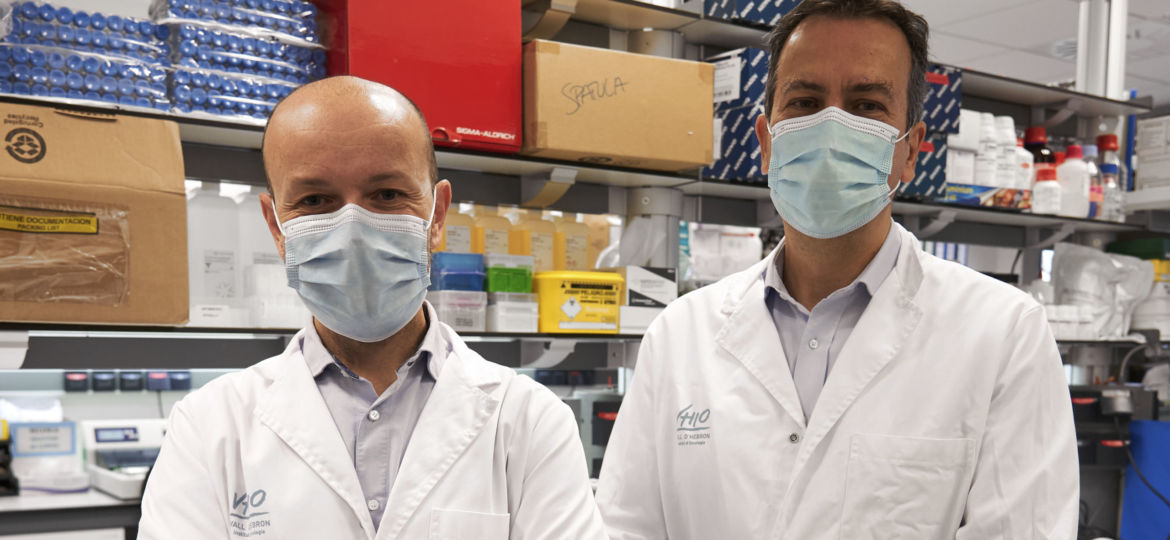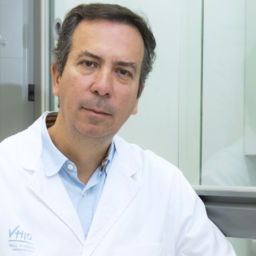
- Findings from a comprehensive clinical, morphological, and molecular analysis of a cohort of 37 pregnant women with and without SARS-CoV-2 infection, show no evidence of vertical transmission in newborns.
- Recently published as an open access Article in The Journal of Clinical Investigation* results point to the role of the placenta as an effective protector against the virus, even in cases of severe infection.
- Carried out in collaboration with investigators at the Policlinico in Milan, VHIO, Vall d’Hebron University Hospital (HUVH) – Vall d’Hebron Research Institute (VHIR), Barcelona, and the University of Basel, Switzerland, the authors suggest that severe placental damage induced by COVID-19 could be damaging for neonatal development, regardless of vertical transmission.
Barcelona, February 18, 2021.- First authored by colleagues at the Policlinco in Milan, with joint Corresponding Authors Joan Seoane, Co-Program Director of Preclinical and Translational Research at VHIO and ICREA Professor, and Paolo Nuciforo, Principal Investigator of our Molecular Oncology Group, research published in The Journal of Clinical Investigation (JCI)* explored the effects of SARS-CoV-2 on placental pathophysiology and the impact on newborns. The investigators studied a cohort of 37 pregnant women in Italy who gave birth during the first wave of COVID-19; 21 of whom had confirmed SARS-CoV-2 infection by PCR testing.
All women, with the exception of two, successfully delivered live and asymptomatic newborns. The first exception was a virus-negative patient who underwent labor induction for therapeutic miscarriage due to chromosomal abnormality. The second case was an infant from a SARS-CoV-2-negative woman who showed perinatal asphyxia – requiring immediate mechanical ventilation and oxygen supplementation during the first 3 days of life, followed by episodes of seizures and neurological symptoms that progressively improved with therapy. The newborn was discharged at 27 days of life in good clinical condition.
Commenting for VHIO’s Global Communications, co-author Paolo Nuciforo observed, “This multidisciplinary research effort, also carried out in collaboration with Andres Antón from our Hospital’s Microbiology Service, has enabled us to show that although COVID-19 can infect the placenta, there was no evidence of vertical transmission in any of the newborns. Our findings indicate that the placenta serves as an effective maternal-neonatal shield against the virus, even in cases of severe infection.”
He continued, “For the first time, we have established the presence of viral load in placental tissue by PCR detection and in-situ hybridization, and shown that, while rare, SARS-CoV-2 can cause severe placental damage which may be detrimental for the neonate. Regarding the case of the newborn who presented with perinatal asphyxia and neurological complications, all of which were treated successfully, these problems were due to severe damage to the placenta caused by the virus.”
The researchers also observed that the severity of the virus-mediated placental changes could be directly related to very high viral burden which was comparable to post-mortem lung specimens from virus-positive patients. The study showed that the damage to the placenta governing the results of the pregnancy, is caused by high viral load, although this is not directly related to any known clinical or pathology parameters in pregnancy.
“We don’t yet know how to more precisely identify these patients in order to offer them alternative treatments to help prevent damage to the placenta. Further studies, including the development of potential biomarkers identified in patients’ blood samples, are therefore required,” noted Paolo Nuciforo.
Inflammatory response to disease: drawing important parallels
Reflecting on the broader implications of the study, Joan Seoane, who is also an ICREA Professor and Principal Investigator of VHIO’s Gene Expression & Cancer Group, said, “By working together with colleagues from other disciplines, we have also been able to draw parallels in the strategies adopted by COVID-19 and cancer cells to evade the immune system. Specifically, we have seen that the inflammatory response triggered by the virus is very similar to that observed in certain tumors. These insights could help to develop novel therapies against the virus itself, but also guide treatment decisions for cancer patients who are especially vulnerable to coronavirus.”
Infectious diseases represent a major preoccupation for oncologists, particularly in cancer patients who are receiving treatment with chemotherapy and/or immune-based treatments, with already compromised immune systems. Achieving a better understanding of COVID-19 and cancer intersection factors therefore represents an opportunity for the development of more effective prevention and treatment strategies.
“Studying the bacteria and other microbes that live on and inside the human body, known as the microbiome, is helping us to better understand cancer predisposition as well as response to therapies,” added Paolo Nuciforo.
“This study exemplifies just what can be achieved by working together with experts in other diseases. This approach can generate important bidirectional synergies to more effectively combat COVID-19 as well as develop more potent anti-cancer medicines,” concluded Joan Seoane.
This study was funded in part thanks to the support received from the Department of Health of the Generalitat de Catalunya – Government of Catalonia.
###
Reference:
*Severe SARS-CoV-2 placenta infection can impact neonatal outcome in the absence of vertical transmisión. Fulvia Milena Cribiù, Roberta Erra, Lorenza Pugni, Carlota Rubio-Perez, Lidia Alonso, Sara Simonetti, Giorgio Alberto Croci, Garazi Serna, Andrea Ronchi, Carlo Pietrasanta, Giovanna Lunghi, Anna Maria Fagnani, Maria Piñana, Matthias Matter, Alexandar Tzankov, Luigi Terracciano, Andres Anton, Enrico Ferrazzi, Stefano Ferrero, Enrico Iurlaro, Joan Seoane, Paolo Nuciforo. J Clin Invest. 2021. https://doi.org/10.1172/JCI145427.



















